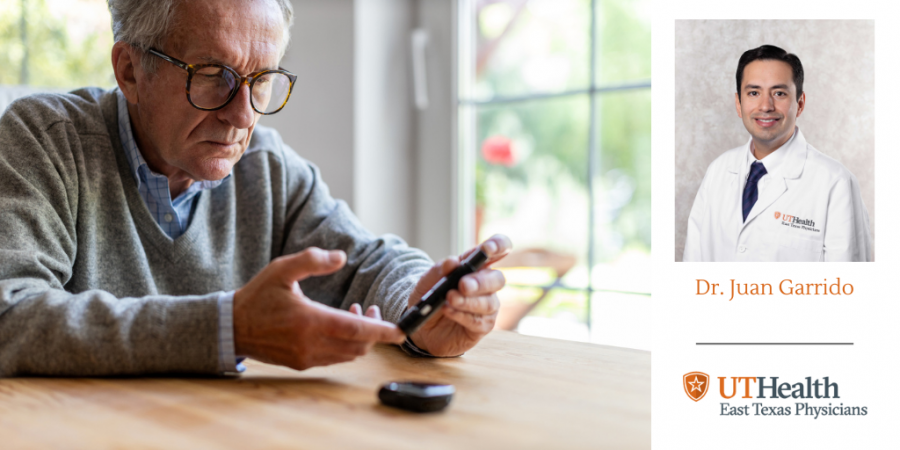
Learn about living with diabetes from Dr. Juan Garrido, an internal medicine physician at UT Health East Texas Physicians at Fifth Street presents, “Diabetes: The basics.”
How do I know if I have diabetes?
Unfortunately, diabetes usually causes no symptoms. When symptoms do occur, they may include needing to urinate frequently, thirst, blurry vision, etc. Most of the time diabetes is diagnosed through a blood test, as a preventive measure, at your doctor’s visit.
What should I do after being diagnosed with diabetes?
Here are the ABCs of diabetes care:
· A1C:
- A1C is a blood test that shows your average blood sugar over the last few months.
· Blood pressure:
- This is the pressure of the blood circulating in the body. Controlling your blood pressure is just as important as controlling your blood sugar.
· Cholesterol:
- Cholesterol is a fatty wax element that circulates in the blood.
Patients who have diabetes are two to three times more likely to have a heart attack or a stroke at a younger age. Individuals with diabetes are also more likely to have kidney problems.
How can I be sure that I am doing a good job with my diabetes care?
Ideally, your A1C should be below seven. Assess this on an individual basis.
Your blood pressure should be 130/80. This should also be assessed on an individual basis. Cholesterol, also referred to as low-density lipoprotein (LDL), which is the bad cholesterol, should be kept below 100 and ideally under 70.
High blood pressure and cholesterol are as important as diabetes since each one independently increases the risk of heart attack, stroke, kidney disease, etc. A combination of poor control of blood pressure, cholesterol and diabetes may result in early and/or fatal consequences.
How do I control my diabetes, blood pressure and cholesterol?
Controlling diabetes is a team process between you, your doctor and nurses to create a lifestyle change. Medications also will be part of your treatment plan. Begin by adjusting your eating habits. Consume healthy foods such as fruits, vegetables and low-fat dairy products. Also, keep your diet low in red meat and fried foods.
Smoking increases the risk by itself of heart attack, stroke and cancer. If you are a smoker, begin a cessation plan as soon as possible. Additionally, do not drink alcohol, because it can increase blood sugar and blood pressure.
If needed, losing weight will also help control diabetes. Staying active for 30 minutes or more, several days per week is also important and has many health benefits. It will also assist in weight loss goals.
The majority of people diagnosed with diabetes need medications to control, not only high blood sugar but also high blood pressure and cholesterol. To keep up with the medication, constant blood sugar and blood pressure monitoring are needed. Being prescribed medications will require a doctor visit to evaluate cholesterol levels with a blood test.
The ABCs of diabetes are the most important factors for the management of the disease. However, these elements are the tip of the iceberg as there are many other factors to consider. Good education and a relationship with your doctor will make a real difference in your care.
Take control of your health and schedule your annual check-up with a trusted UT Health East Texas Physician. We offer a variety of services to care for the whole family. To schedule an appointment, call 903-596-DOCS or visit www.UTHealthEastTexasDoctors.com.

